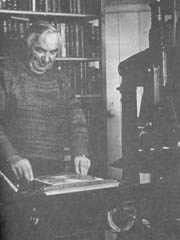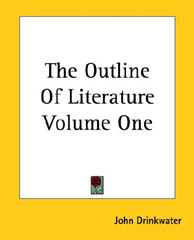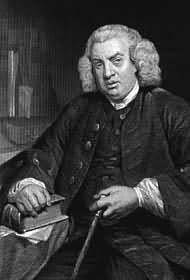By
Castlelaw Unto Themselves
 I was brought up with my grandparents near Howgate, Penicuik. My grandmother had a wee shop that sold everything – mineral water, cigarettes, Duncan’s penny bars of hazelnut chocolate – and inside the counter, which was really one of these old-fashioned Scottish kists, were hundreds of paperback romances. These were the only books in the house. My grandfather was a keen reader. He used to drink a bit, but on the Sunday after the Saturday he would get a book out and before I could read myself I noticed how he would shut himself off from the rest of the world by this reading. I can’t remember exactly when and how I learned to read, but Ethel M. Dell and the rest had taught me all about romance by the time I was nine! I went to Howgate village school. The teacher had at least five classes to teach at once. She began in the morning with a chapter from the Bible and everyone who could read, read a verse each, while the rest listened. At the end of the day she always read us a story, maybe Ruskin’s King of the Golden River or one of Andrew Lang’s fairy tales. That was a great incentive for me. I was a young child on my own with a lot of older people at home, and my imagination was nurtured by this teacher: I very quickly began reading and being interested in books.
I was brought up with my grandparents near Howgate, Penicuik. My grandmother had a wee shop that sold everything – mineral water, cigarettes, Duncan’s penny bars of hazelnut chocolate – and inside the counter, which was really one of these old-fashioned Scottish kists, were hundreds of paperback romances. These were the only books in the house. My grandfather was a keen reader. He used to drink a bit, but on the Sunday after the Saturday he would get a book out and before I could read myself I noticed how he would shut himself off from the rest of the world by this reading. I can’t remember exactly when and how I learned to read, but Ethel M. Dell and the rest had taught me all about romance by the time I was nine! I went to Howgate village school. The teacher had at least five classes to teach at once. She began in the morning with a chapter from the Bible and everyone who could read, read a verse each, while the rest listened. At the end of the day she always read us a story, maybe Ruskin’s King of the Golden River or one of Andrew Lang’s fairy tales. That was a great incentive for me. I was a young child on my own with a lot of older people at home, and my imagination was nurtured by this teacher: I very quickly began reading and being interested in books.
My grandmother kept hens, and when I was twelve my job on a Saturday was to deliver maybe two basket of eggs down to various customers in Penicuik. I used to get threepence here and twopence there. That allowed me to take a sixpenny return on the train to Edinburgh after I had done my deliveries and still have about one and six over. I used to go around all the bookshops looking for books, buying for quantity, not for the contents. In those days, the 1930s, there was a very reasonable bookshop opposite the Dental College in Chambers Street. There was a shop down Leith Walk, Williamson’s, at Haddington Place, which had a hut out at the front where the very cheap books were sold, and there were more in the dark recesses behind. Then I went to Willis’s in a basement in St Andrew’s Square. That was a great shop for me, a lot of books for a penny, twopence and threepence. I went to Thin’s very occasionally, usually to get a new book.
I left school when I was about fifteen, and my first job was spreading manure on a farm. I didn’t like it, I had to put the harness on the horse and I was frightened of it. After about three months, somebody got me a job in a paper mill in Penicuik. I didn’t like that at all. Terrible noise in a factory. Deafening. But at least I was getting more money and that allowed me to buy more books. Then the war came. My friends and I decided we were all going to join up, and on the second of September, it was a Saturday, I tried to get into the Air Force. They told me to come back on Monday. By Monday my enthusiasm had waned a bit. However, I did join up about a year later, and went into the Air Force. I did my training here and then I was posted overseas to Egypt, where I was ill for about three months with dysentery. Then I was sent to Jerusalem. I had to go to headquarters to have a decision made as to where I would be going in the Middle East. I was very apprehensive. I was really just a wee boy from the country, I wasn’t brave or anything. But as it turned out, the fellow who was to make this decision knew me from the Howgate days. When he was a student he had worked as a roadmender during his holidays alongside my grandfather who was a roadman. As a wee boy I had played around and watched them. He arranged for me to stay in Jerusalem. I had a very lucky war in the sense I was away from most of the fighting. Jerusalem was what you might call a ‘Cushy number’. I worked about eight hours every day and the rest of the time I was fairly free. There was a most wonderful YMCA library where I spent a lot of my off-duty time; often I was the only person in the place. This was my education. There was nothing structured about it. I just read and read and read.
 I bought lots of books during my three years in Jerusalem, and when I came back at the end of the war I had one kit-bag for my Army stuff, and one kit-bag full of books, including Drinkwater’s Outline of Literature, which I liked to refer to, and a lovely set of the works of William Morris. I had the idea that I would try and get a job in a bookshop, and wrote to people like Kitty Foyle. I had an interview, but with no experience and a Penicuik accent I must have looked an absolute rookie. Noting came of that. However, I got a job with Martin Dunlop, who had a shop at 52 George IV Bridge in Edinburgh, just along from the National Library of Scotland. I said to him I wasn’t too concerned about the money I earned. I began at £3 a week and he gave me a trial for a fortnight. After that he kept me on and I worked with him till 1952, and every single quarter he gave me a rise. It was a very just way of treating an employee.
I bought lots of books during my three years in Jerusalem, and when I came back at the end of the war I had one kit-bag for my Army stuff, and one kit-bag full of books, including Drinkwater’s Outline of Literature, which I liked to refer to, and a lovely set of the works of William Morris. I had the idea that I would try and get a job in a bookshop, and wrote to people like Kitty Foyle. I had an interview, but with no experience and a Penicuik accent I must have looked an absolute rookie. Noting came of that. However, I got a job with Martin Dunlop, who had a shop at 52 George IV Bridge in Edinburgh, just along from the National Library of Scotland. I said to him I wasn’t too concerned about the money I earned. I began at £3 a week and he gave me a trial for a fortnight. After that he kept me on and I worked with him till 1952, and every single quarter he gave me a rise. It was a very just way of treating an employee.
Dunlop’s was a one-man shop, he did catalogues, bought at auction, watched the shop. The Clique was a very great thing on a Thursday. Immediately after it arrived he went through the Books Wanted section and marked off the books that he had, and I wrote off the details. I gradually came to do all the different things in the shop. Of course when you are being trained, you are always dependent on the interest of the person who is training you. Martin Dunlop’s uncle, who had worked in Grants for many years, had started the business, and, as often happens, when someone comes into a family business it’s never the same. Marty wasn’t interested in reading or books as such, but he was quite keen on buying and selling them. He taught me a lot, but I feel I was taught much more by customers. Their enthusiasm is very infectious. I have a magpie mind and can change my enthusiasm from one thing to another. I used to scour the town to find things that I thought particular collectors might not have.
Marty tended to throw out books because they were dirty and torn. I was always wanting to take things out of the wastepaper, but I very seldom asked him if I could. The way Marty had the shop arranged, all the catalogue books were inside; at the door he had a stall of shilling books and on the opposite side a stall of sixpenny books, and at the corner facing onto the street he had threepenny books on another two little shelves; and he had a special row of books at eye-level which he changed every Saturday for fresh stock that was a terrible temptation for me. I felt too scared to buy more than one book when the morning started, but by the time afternoon came and people had been in I felt I could buy the rest I wanted.
In 1948 I met Marion, and after a spell we got married. At first I kept working with Marty. Marion thought it would be a good idea if I became a bookseller in my own right. I was thirty-two at the time. I had imagined that I’d never be able to afford to be a bookseller until I had a white beard. Then one day we saw advertised in the newspaper a shop for sale at 41 Bruntsfield Place, Edinburgh. In fact it was two shops which had been made into one, going for something like £1,100. We went ahead and bought it, though we could barely scrape together the deposit. But we hit upon the brilliant idea of making it back into two shops again, and we managed to sell the smaller one for almost as much as we had paid for the two together.
We worked for a fortnight trying to get the shop painted, the shelves up and the linoleum down, the last three days and nights without sleeping, to be ready to open one Saturday lunchtime. Marion alone had the pleasure of our first customer. I was fast asleep. It was Mr Riddell, a bank inspector by profession and an avid collector whose particular interest was literature. He became an excellent customer. Somehow he always walked through the door just when I was putting a new collection on the shelves.
Our life in the bookshop began quite simply. We lived in the back shop. We sawed the legs off Marion’s family table and got a mattress for the top and a stool along the back. At lunchtime we could have a wee lie down if there were no customers. I had already accumulated quite a lot of stock, and whenever we went on a jaunt we’d go somewhere there was a bookshop or a Jumble Sale.
At the outset I followed Marty’s ideas, though later I developed my own way of doing things. We changed the window displays every fortnight to attract passers by. People loved to come in and browse. On the walls the books were arranged in different categories, but in the middle of the shop I had a table with the new stock, always changing. There were a lot of bargains. I still believe that booksellers do well to provide bargains for their clients, because that really is what makes your business. Word gets round about these bargains, and people going round the shops on a Saturday certainly come and visit you. I always liked to move the books, make space, have change and get more books. The great thing about the buying of books is having something new to look at. In almost every lot of books there is something you want to keep for yourself, maybe not forever, but certainly for a while.
From the very beginning I kept a stock book into which I entered every book that I bought for over £1. If I sold something that was too cheap, that was something to learn from. I never worried about it.  Once I had a first edition of Johnson’s Lives of Poets, in the original wrappers, and the bookseller who bought it told me, ‘You’ll regret selling this.’ I didn’t. I was much more concerned about the next lot of books that I was going to buy. I found that more exciting in a way. For some reason a lot of ministers’ widows stayed in Leamington Terrace, near the shop, and they often used to come in with a couple of books for sale, probably by Annie S Swan. They loved to talk. Most of my interesting buys were in other bookshops, I have to say. In an Aberdeen bookshop, for example, I bought for £22 a collection of Thomas Otway’s plays which had belonged to William Congreve and had his signature on the first title-page. I discovered it was one of fourteen known missing books from his library.
Once I had a first edition of Johnson’s Lives of Poets, in the original wrappers, and the bookseller who bought it told me, ‘You’ll regret selling this.’ I didn’t. I was much more concerned about the next lot of books that I was going to buy. I found that more exciting in a way. For some reason a lot of ministers’ widows stayed in Leamington Terrace, near the shop, and they often used to come in with a couple of books for sale, probably by Annie S Swan. They loved to talk. Most of my interesting buys were in other bookshops, I have to say. In an Aberdeen bookshop, for example, I bought for £22 a collection of Thomas Otway’s plays which had belonged to William Congreve and had his signature on the first title-page. I discovered it was one of fourteen known missing books from his library.
I carried on with the bookshop until about 1960. At that point we decided we would try working from the country, and managed to get the gardener’s cottage on a small estate at Paxton in Berwickshire. It was quite idyllic, lovely and quiet. I began to do more cataloguing. I like reading through the catalogues I get from other booksellers, some are very erudite and scholarly and full of information. I used to go through all the catalogues that were sent to me and work out how many books were at £500 or £200 or £100, right down to £5; the make up of the catalogue showed how different people tried to make bookselling viable. I got a catalogue this morning in which all the books are priced between £10 and £20. My own approach was always to have several really good things in every catalogue. Most people can’t stretch to buying books for hundreds of pounds, though someone might, but everyone likes to see these things, to know they are around. Over the years I got to know what my own customers were likely to want. I went through the names and addresses of my buyers after every catalogue, marking off on a card index whether they had bought or not. If somebody didn’t buy in say, seven or eight catalogues, well I wasn’t their bookseller. Now that we were working from home, Marion and I were still both involved in the bookselling. Marion did the typing, I did the buying, and we usually discussed the books as they came in. We still enjoyed the life, because we were always meeting people, people came to see us no matter where we were. Yet it wasn’t quite the same as the bookshop. Having a bookshop is something quite by itself.
© Alex Frizzell 1990

Comments